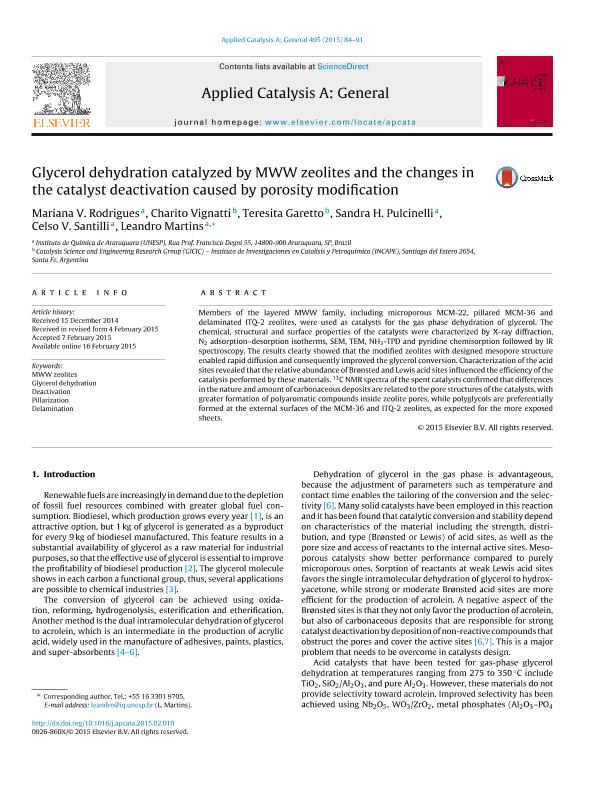Mostrar el registro sencillo del ítem
dc.contributor.author
Rodrigues, Mariana V.
dc.contributor.author
Vignatti, Charito Ivana

dc.contributor.author
Garetto, Teresita Francisca

dc.contributor.author
Pulcinelli, Sandra H.
dc.contributor.author
Santilli, Celso V.
dc.contributor.author
Martins, Leandro

dc.date.available
2018-02-16T18:58:30Z
dc.date.issued
2015-04
dc.identifier.citation
Rodrigues, Mariana V.; Vignatti, Charito Ivana; Garetto, Teresita Francisca; Pulcinelli, Sandra H.; Santilli, Celso V.; et al.; Glycerol dehydration catalyzed by MWW zeolites and the changes inthe catalyst deactivation caused by porosity modification; Elsevier; Applied Catalysis A: General; 495; 4-2015; 84-91
dc.identifier.issn
0926-860X
dc.identifier.uri
http://hdl.handle.net/11336/36643
dc.description.abstract
Members of the layered MWW family, including microporous MCM-22, pillared MCM-36 and delaminated ITQ-2 zeolites, were used as catalysts for the gas phase dehydration of glycerol. The chemical, structural and surface properties of the catalysts were characterized by X-ray diffraction, N2 adsorption–desorption isotherms, SEM, TEM, NH3-TPD and pyridine chemisorption followed by IR spectroscopy. The results clearly showed that the modified zeolites with designed mesopore structure enabled rapid diffusion and consequently improved the glycerol conversion. Characterization of the acid sites revealed that the relative abundance of Brønsted and Lewis acid sites influenced the efficiency of the catalysis performed by these materials. 13C NMR spectra of the spent catalysts confirmed that differences in the nature and amount of carbonaceous deposits are related to the pore structures of the catalysts, with greater formation of polyaromatic compounds inside zeolite pores, while polyglycols are preferentially formed at the external surfaces of the MCM-36 and ITQ-2 zeolites, as expected for the more exposed sheets.
dc.format
application/pdf
dc.language.iso
eng
dc.publisher
Elsevier

dc.rights
info:eu-repo/semantics/openAccess
dc.rights.uri
https://creativecommons.org/licenses/by-nc-sa/2.5/ar/
dc.subject
Mww Zeolites
dc.subject
Glycerol Dehydration
dc.subject
Deactivation
dc.subject
Pillarization
dc.subject
Delamination
dc.subject.classification
Otras Ingeniería Química

dc.subject.classification
Ingeniería Química

dc.subject.classification
INGENIERÍAS Y TECNOLOGÍAS

dc.title
Glycerol dehydration catalyzed by MWW zeolites and the changes inthe catalyst deactivation caused by porosity modification
dc.type
info:eu-repo/semantics/article
dc.type
info:ar-repo/semantics/artículo
dc.type
info:eu-repo/semantics/publishedVersion
dc.date.updated
2018-01-18T14:39:11Z
dc.journal.volume
495
dc.journal.pagination
84-91
dc.journal.pais
Países Bajos

dc.journal.ciudad
Amsterdam
dc.description.fil
Fil: Rodrigues, Mariana V.. Instituto de Química de Araraquara (UNESP); Brasil
dc.description.fil
Fil: Vignatti, Charito Ivana. Consejo Nacional de Investigaciones Científicas y Técnicas. Centro Científico Tecnológico Conicet - Santa Fe. Instituto de Investigaciones en Catálisis y Petroquímica ; Argentina
dc.description.fil
Fil: Garetto, Teresita Francisca. Consejo Nacional de Investigaciones Científicas y Técnicas. Centro Científico Tecnológico Conicet - Santa Fe. Instituto de Investigaciones en Catálisis y Petroquímica ; Argentina
dc.description.fil
Fil: Pulcinelli, Sandra H.. Universidade Estadual Paulista Julio de Mesquita Filho; Brasil
dc.description.fil
Fil: Santilli, Celso V.. Universidade Estadual Paulista Julio de Mesquita Filho; Brasil
dc.description.fil
Fil: Martins, Leandro. Universidade Estadual Paulista Julio de Mesquita Filho; Brasil
dc.journal.title
Applied Catalysis A: General

dc.relation.alternativeid
info:eu-repo/semantics/altIdentifier/doi/http://dx.doi.org/10.1016/j.apcata.2015.02.010
dc.relation.alternativeid
info:eu-repo/semantics/altIdentifier/url/https://www.sciencedirect.com/science/article/pii/S0926860X15000824
Archivos asociados
